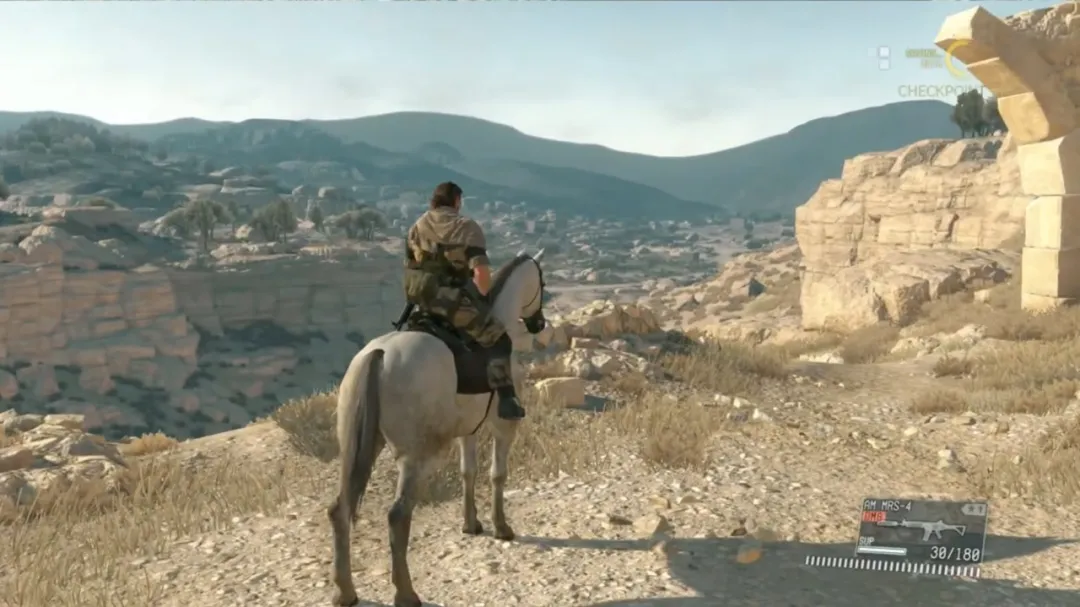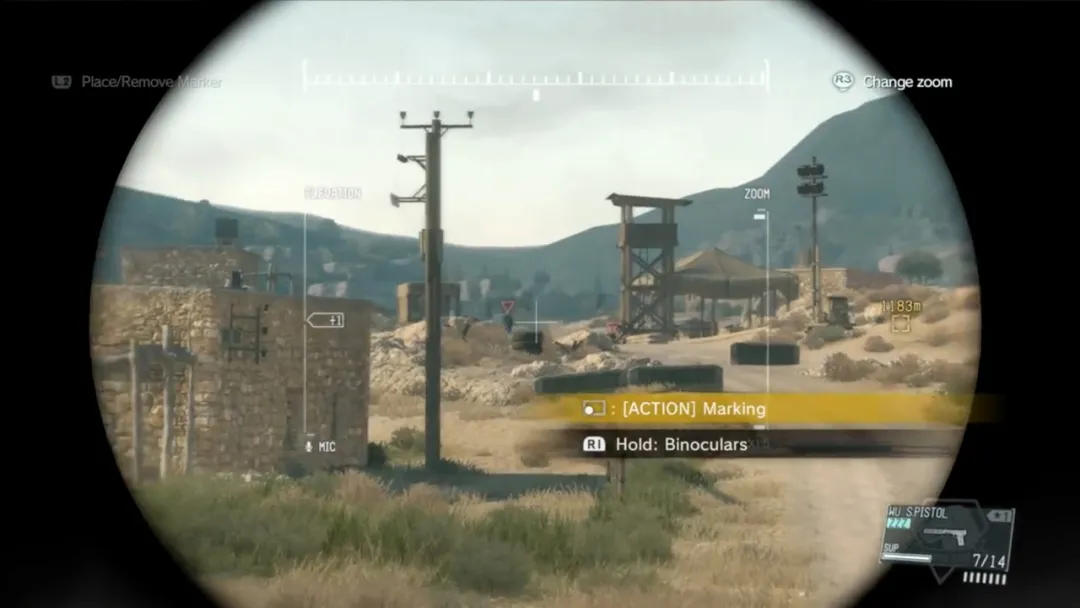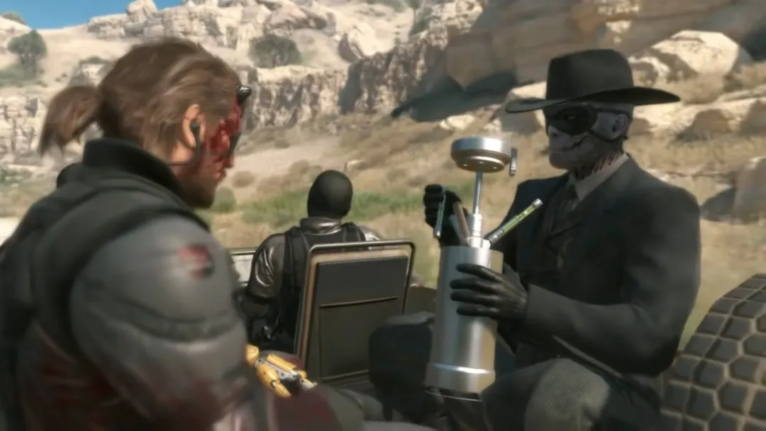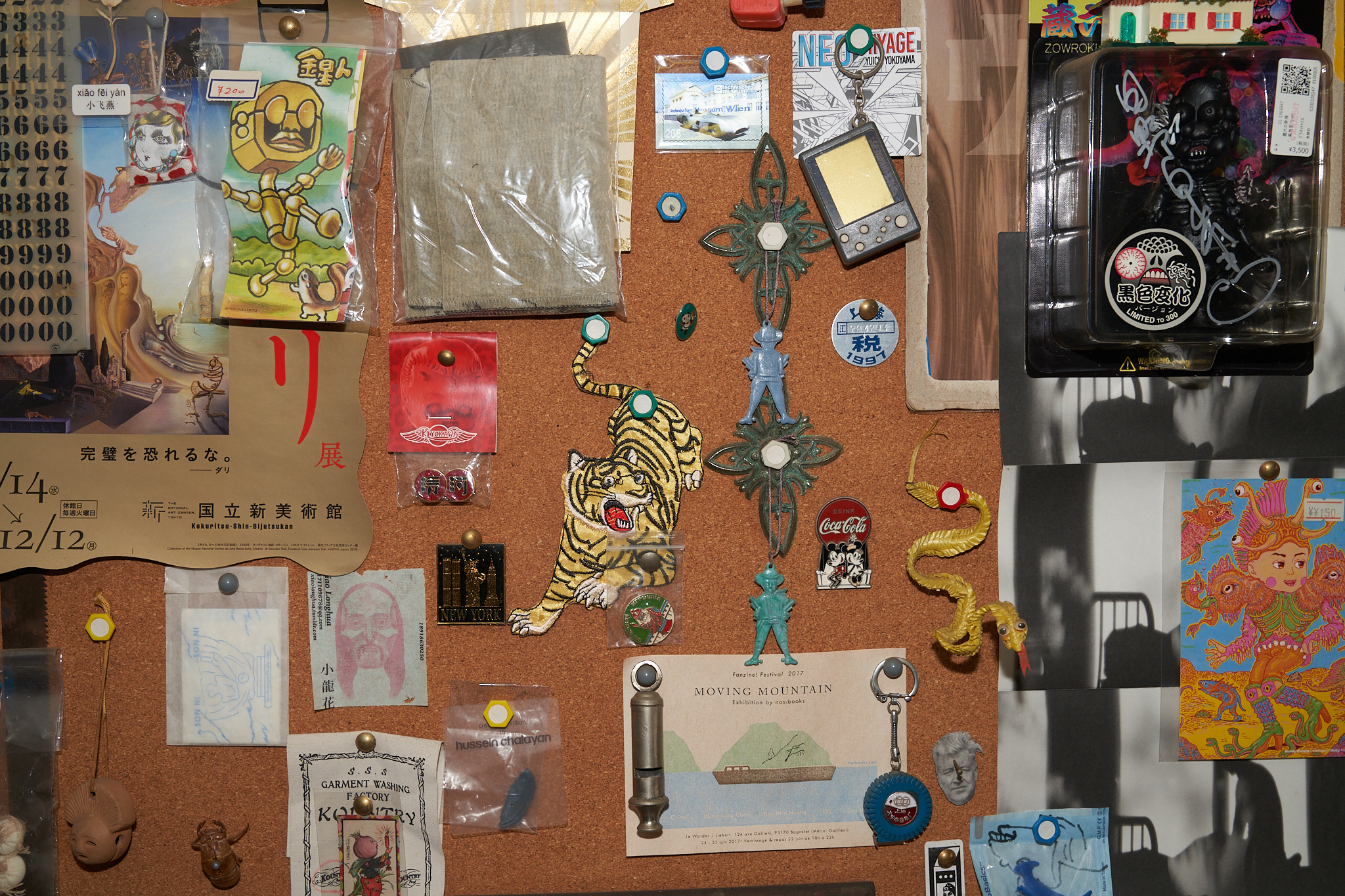The Phantom Pain of Language
| October 14, 2024

“Big Boss” in the deserts of Afghanistan.
Unless otherwise specified, all images are screenshots from the game Metal Gear Solid V: The Phantom Pain, and under fair use.
After a human or animal undergoes amputation, they could still occasionally feel pain in the amputated limb. This phenomenon is medically referred to as “phantom pain,” and its cause seems to remain a subject of speculation—it is possibly a post-traumatic stress disorder or perhaps a neurological disorder… Many amputees are enduring the torture of phantom pain, which could be intermittent, persistent, or even lifelong.
The 11th installment of the game series Metal Gear, released in September 2015, took this medical term as its title—Metal Gear Solid V: The Phantom Pain. The game combines stealth, open-world exploration, and action-adventure elements to deliver a narrative set in the Cold War during the 80s, allowing players to freely navigate the Afghan desert during the Soviet-Afghan War or the central African jungle during the Angolan Civil War. The titular “Metal Gear” is a tactical nuclear platform capable of launching nuclear attacks on the move, and this ultimate weapon was introduced in the first Metal Gear game released in 1987. Metal Gear games have always focused on stealth, often casting players as special forces operatives who infiltrate enemy camps solo to carry out rescue, assassination, sabotage, and eavesdropping missions. Players must strategically design routes, use weapons and tools smartly, and leverage weather and other factors to complete the missions covertly—lest they exchange fire with the enemy troops and quickly become surrounded. The Phantom Pain is highly realistic with its depictions of battlefield details, such as radio communication, helicopter airdrops, and calls for fire reinforcements, pushing its emphasis on tactics, intel gathering, and action to its limit. While such game designs have rendered the game less cathartic than games where you fight hordes of enemies heads on, they have also granted the game’s director, Hideo Kojima, much creative space to express his ideas.
For over twenty years, the Metal Gear series has addressed many weighty historical and contemporary subjects, such as nuclear deterrence, censorship, artificial intelligence, genetic engineering, and the meaning of peace. As the final Metal Gear game made by Kojima before he left the game’s developing team, Konami, The Phantom Pain places language at the core of its narrative. The player controls the legendary mercenary “Big Boss,” a former CIA agent who became the leader of a borderless military organization, holding the ideal that soldiers should transcend ideologies and fight for themselves. His base was later destroyed, and he was gravely injured by an explosion, making him lose an arm and putting him into a 9-year coma. The story of The Phantom Pain begins with his waking and the installment of his metal prosthetic arm. Yet, the phantom pain is not just about the limb lost in war. The three central characters of the story—Skull Face, Quiet, and “Big Boss”—suffer from phantom pain that originates from colonialism, ethnic identity, gender, and self-identification, all of which are entangled with language.

Marking enemies with binoculars to plan actions.
It is No Nation We Inhabit, But a Language
Skull Face is the player’s sworn enemy, as he is responsible for ambushing and destroying the borderless military base built by “Big Boss.” But as the story progresses, the player realizes that Skull Face’s end-game revolves around an engineered parasite referred to as ethnic cleansers or liberators, which attach themselves to human vocal cords, hence its other name: vocal cord parasites. Certain sounds would trigger their mating, and the offspring would infest the host’s lungs, eventually killing the host. The aforementioned sounds are a specific language. In other words, they attack people who speak a particular language. As the player finally encounters Skull Face, what awaits them is not a grand showdown but rather his dramatic monologue as the player shares a ride with him on a jostling military pickup truck:
“I was born in a small village. I was still a child when we were raided by soldiers. Foreign soldiers. Torn from my elders, I was made to speak their language. With each new post, my masters changed, along with the words they made me speak. Words are… peculiar. With each change, I changed too. My thoughts, personality, how I saw right and wrong…War changed me—and not only my visage. Words can kill. I was invaded by words, burrowing and breeding inside me. A philosopher once said: ‘It is no nation we inhabit, but a language. Make no mistake, our native tongue is our true fatherland.’ My fatherland—my truth was stolen from me, and so was my past. All that’s left is the future, and mine is revenge. On those who’d leech off the words of their fellow man.”
Skull Face didn’t just lose his appearance and limbs. Above all else, he lost his mother tongue, and to him, linguistic identification is equivalent to ethnic-, national-, and even self-identification. After the amputation of his native tongue, the excruciating phantom pain transformed him and fueled his quest for vengeance, and the subject of his retribution was none other than language. Skull Face attempts to wipe out English with the vocal cord parasites, for in his view, the Cold War and colonialism can only end with the extinction of English as an international language, then the world can truly embrace freedom. In this process, his Metal Gears became the key to giving balance to the world: “The world will need a new common tongue—a language of nukes. My Metal Gears shall be the thread by which all countries are bound together, in equality. No words will be needed. Every man will be forced to recognize his neighbor, people will swallow their pain, they will link lost hands, and the world will become one. This war…is peace.” “Big Boss” sits through his speech without saying a word, leaving it open for the player’s interpretation. At this moment, the so-called “adversary” that stands in front of the player is no longer a concrete person or object but language and colonialism, as well as Skull Face’s extremely radical decolonization through the extermination of English and the establishment a new world order stabilized by nuclear deterrence.

Skull Face holding a vocal cord parasite, delivering a monologue to “Big Boss.”
As his base becomes infiltrated with vocal cord parasites, “Big Boss” ventures into a rain forest to find a mysterious elderly “decipher” of Navajo descent called Code Talker, which leads him to finally understand the parasites. The older man also provided him with indigenous herbs that can put the parasites into a dormant state, as well as a microorganism that can mutate male parasites into females, thereby rendering them infertile. Clearly, the metaphor-laden moniker of “decipher” underlines Indigenous people’s role as a central force against colonialism. The encoding and decoding systems of language proliferate like parasites, and language itself is an agent of colonialism. Languages spread by colonial empires, such as French, Spanish, and Portuguese, are still widely spoken in countries in Asia, Africa, and Latin America, while English, considered today’s global language, continues to disseminate Western cultures and values.
In the art world, we have also gradually assimilated the writing conventions of the English language. For instance, Chinese galleries and institutional exhibitions tend to use writing styles that are translation-ese, such as “xxx is delighted to present the xxx exhibition.” James Elkins points out that the dominance of English in art history could mean the end of diversity in art historical writing.[1] Languages entail certain ways of research, analysis, and interpretation, particularly in post-structuralist symptomatic reading. After Roland Barthes famously declared “the death of the author,” Fredric Jameson argues in his The Political Unconscious that interpretative work should aim to demonstrate “what is not evident in the appearance of things, but rather in their underlying reality.”[2] Today, the dominant method of visual analysis in art history research still interprets all artworks as readable texts, yet this is clearly inadequate and out of place in the face of increasingly diverse art forms such as research-based practice and social interventions. Just like “Big Boss” as he listens to Skull Face’s monologue, we are facing something beyond specific art, artist, art history, or art theory. We face language—because only language is the agonizing phantom pain.
A Female Predicament that Exists in the Absence of Words
Quiet makes her first appearance in the prologue as an assassin sent by Skull Face to kill “Big Boss.” She is severely burned by a medical alcohol bottle during the fight and barely escapes by breaking through a window. Skull Face saves her life through full-body “parasite therapy,” which grants her superhuman abilities such as invisibility and teleportation, making her a top-tier sniper. However, the procedure also turns her “vegetative” as she now requires skin respiration to maintain blood oxygen levels—her skin absorbs nutrients through a process similar to photosynthesis, and covering her skin would cause her to suffocate. Quiet’s attire in the game is, therefore, quite revealing, which becomes a subject of criticism for its over-sexualization of the female body and appeal to the male gaze.[3] Quiet, seeking revenge, faces “Big Boss” again in Afghanistan, only to be captured after she loses the sniper match; yet, this is also part of Skull Face’s plan, as he has already implanted vocal cord parasites into her body, effectively turning her, now a prisoner of war, into a bioweapon for spreading the infestation in “Big Boss”’s base. But as she is moved by the camaraderie between “Big Boss” and members of his base, she decides to prevent the spread of the parasite by staying completely silent—which is why she comes to be known as “Quiet.” In the 45th chapter of the game, “A Quiet Exit,” to save an injured “Big Boss,” Quiet has to use English to call in a rescue helicopter. To keep the parasite away from those she cares about, she disappears alone into the desert, sacrificing herself and only leaving behind a cassette tape recording for “Big Boss”:
“I did not choose to be quiet. I wanted to express my feelings to you…if only we shared a ‘common tongue.’ Vengeance was what drove me to you, the only language left to me was revenge. But the words we shared… no, that was no language at all. That is why I chose the language of gratitude instead and went back to silence. I am Quiet… I am the absence of words.”
Quiet’s revealing outfit and over-sexualized body makes her one of the many female characters designed around sex appeal, joining alongside Lara Craft from the Tomb Raider series, Mai Shiranui from the King of Fighters series, and Tifa from Final Fantasy VII, which just received a remaster. In recent years, characters such as Abby from The Last of US II and Eloy from Horizon: Forbidden Dawn have also sparked discussions on how female characters are portrayed in games and issues surrounding diversity. Beyond her appearance, visage, and physique, Quiet, a female character deprived of her language, represents a kind of “schizophonic” phantom pain—a female predicament that exists in the absence of words.

Quiet at “Big Boss’s” base.

Quiet’s silhouette disappearing into the desert.
“Schizophonia” is a term coined by Murray Schafer to discuss the relationship between original sounds and their electroacoustic reproduction in the field of sound studies. The original sound is directly linked to the mechanisms that produce it, whereas electroacoustic reproductions, e.g., sound effects prevalent in films and video games, lead to a decoupling of sounds from their production mechanisms.[4] The Phantom Pain is not a silent film, and Quiet is neither deaf nor mute, but her soundscape is oppressed and dominated by the sounds of battlefields and men, leading to a traumatic audio-visual disjunction. Under the twin influence of the “parasite therapy” and the vocal cord parasite, Quiet has become at once superhuman and inhuman. She sometimes hums but cannot speak, and she suffers torture and humiliation for constantly being misunderstood.
The woman never needs to be heard. The highly adaptable patriarchy under the capitalist paradigm continues to place women under the role of providing domestic labor and emotional value.[5] In The Phantom Pain, against the backdrop of the Cold War, the woman becomes a bioweapon for carrying the virus, an instrument that serves Skull Face’s radical decolonization ideal, and a martyr who silently disappears into the desert to save “Big Boss.”
In many games, female characters are either there to be saved or sacrificed. For instance, the mentor figure “the Boss” from Snake Eater, an earlier entry of the Metal Gear series, is portrayed as a traitor to her country and is killed by “Big Boss.”; Meanwhile, Paz, from another entry called Ground Zeroes, becomes a human bomb. Other examples are Princess Zelda from The Legend of Zelda: Tears of the Kingdom and the six girls from last year’s trending game Love is All Around, who throw themselves at the protagonist. Quiet is humiliated in the game for her body and clothing, which is undeniably a kind of slut shaming, but her final sacrifice prompts worship as a holy woman. However, both “slut shaming” and “saint worship” are deeply ingrained misogynies that elude articulation by language, yet they are a fundamental aspect of the female experience.

Upon learning he is a decoy, “Big Boss” shatters the glass in front of him with a punch.
No Meaning, Only Explanations
In the final chapter of the game, titled “Truth: The Man Who Sold the World,” “Big Boss” walks up to a mirror, which shows another man’s visage. It is revealed that nine years ago, during the ambush on the base, a medic saved “Big Boss” by shielding him from an explosion, and as a result, the medic sustained severe injuries. During his coma, the medic received plastic surgery and, after he woke up, was continuously brainwashed into believing that he was “Big Boss” and rebuilt the borderless organization with a group of allies. The real “Big Boss” left a cassette tape for his body double with the following message:
“I’m Big Boss, and you are, too. No, he’s the two of us. Together. Where are we today? We built it. This story—this “legend”—it’s ours. We can change the world, and with it, the future. I am you and you are me. Carry that with you, wherever you go. Thank you, my friend. From here on out, you’re Big Boss.”
Perhaps the player also believed that they were cast as “Big Boss,” but the protagonist is, in fact, entirely shaped by language. The medic’s own language is amputated and replaced by the language of “Big Boss,” allowing him to become the legendary leader of the military organization. “We have no nation, no philosophy, no ideology. We go where we’re needed, fighting, not for the government, but for ourselves.” But this “Big Boss” eventually becomes the final boss to be killed by the player in the first Metal Gear game from 1987. The fate of the character, therefore, reaches a roughly closed loop throughout the series.
Games are also worlds made of language. Through the technical languages of game engines, programming, and more, video games seemingly bring interactive worlds into being from the virtual void. However, no virtual environment is absolutely empty. Instead, they’re laden with their creators’ languages of cultural and aesthetic reference. The Phantom Pain also flirts with the question: are issues pertaining to gender, nation, and race really about the encoding and decoding systems of language? It doesn’t matter who “Big Boss” is because he, too, is merely a product of language. In his sociologist textbook, Social Problems, Joel Best calls attention to the rhetoric of social issues, which almost always frames social issues as matters of language structures.[6] So, is eliminating language and rhetoric a way to solve social problems? How should we understand Skull Face’s “ethnic cleansers” and his extreme decolonization?
Everything is language, everything is phantom pain.
1
James Elkins. The End of Diversity in Art Historical Writing: North Atlantic Art History and Its Alternatives. Berlin[M]. De Gruyter, 2020.
2
Fredric Jameson. The Political Unconscious: Narrative As A Socially Symbolic Act. Ithaca[M]. NY: Cornell University Press, 1981: 60.
Gandolfi, E., & Sciannamblo, M. (2019). Unfolding female quiet in wargames: gender bias in Metal Gear Solid V: The Phantom Pain from representation to gameplay. Feminist Media Studies, 19(3), 331–347.
4
R. Murray Schaffer. The Sound- scape: Our Sonic Environment and the Tuning of the World. Rochester[M]. VT: Destiny Books, 1977: 273.
5
杰玛·哈特莉(Gemma Hartley) 译 / 洪慧芳《她们不是唠叨,只是 受够了:不被看见的情绪劳动》(新星出版社,2023 年 9 月;
上野千鹤子译 / 吕灵芝《无薪主妇:以爱为名的剥削》(北京联合出版公司, 2023 年 8 月)。
Joel Best. Social Problems. New York[M]. NY: W. W. Norton & Company, 2020.
Yuxiang Dong is an artist and a lecturer in new media art at the University of Illinois Urbana-Champaign. He was a recipient of the Joint Second Prize in the 5th International Awards for Art Criticism.
Translated by Kevin Wu

